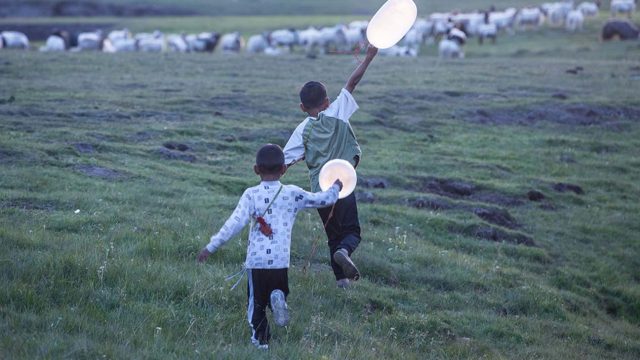BALLOON (QIQIU)
(director/writer: Pema Tseden; cinematographer: Lu Songye; editors: Liao Ching-Sung, Jin Di; music: Peyman Yazdanian; cast: Sonam Wangmo (Drolkar), Jinpa (Dargye), Yangshik Tso (Shangchu Drolma, The Nun), Konchok (Grandfather), Druklha Dorje (Young Son), Palden Nyima (Young Son), Duldul (Jamyang, Teenage Son), Kangchen Tsering (Female Doctor), Kunde (Teacher); Runtime: 102; MPAA Rating: NR; producers: Huang Shufeng, Jacky Pang; Factory Gate Films; 2019-China-in Chinese and Tibetan with English subtitles)
“A harsh realistic family drama shot like a documentary.”
Reviewed by Dennis Schwartz
Tibetan author and director Pema Tseden (“Jinpa”/”Old Dog”) gives us a harsh realistic family drama shot like a documentary. It tells of the clash in the rural mountain regions of Tibet between the generations of the traditional and modern Tibetans over sexual issues. The subtle political film frames its narrative humorously around China’s one-child (updated to two-child) policy and the problems it causes to the modern-day Tibetan families living under Chinese rule. It hints at how traditional family roles are being changed by the political realities of the official ban on large families and the stiff fines imposed by the Chinese government for those going over the limits set for having children.
On the vast empty plains of Tibet, Dargye (Jinpa) and his wife Drolkar (Sonam Wangmo) are sheep farmers. Their teenage boy Jamyang (Duldul) is in school and the two small boys (Druklha Dorje & Palden Nyima) are playing at home. The bashful Drolkar tells a young woman doctor (Kangchen Tsering) at the local health clinic, that she has run out of the free condoms handed out at the clinic and plans to have her tubes tied. But meanwhile, her little boys inflate the condoms she hides under the bedclothes, believing they’re balloons.
When the two boys trade a so-called balloon for a neighbor boy’s whistle, their humorless neighbor goes berserk and in a farcical way goes after Dargye for his kids being a bad example for his child.
Another story reflecting how uptight are these Tibetans over sex, tells about Drolkar’s melancholy sister, Shangchu Drolma (Yangshik Tso), who has become a Buddhist nun. One day she is waiting at school to pick up her nephew Jamyang and is upset to see her old paramour, now a teacher (Kunde). He has been recently divorced and still wants her, but she shudders when she thinks of him and calls her relationship with him her “unforgivable sin.” We learn no more about their affair. But before she leaves the teacher gives her a book he has published — which is about their love affair. She wants to read it, but at home Drolkar gets rid of it in an act of puritanical disgust. Thereby the relationship between the former lovers has no chance of being revived.
The central point of the film develops when Drolkar becomes pregnant with her fourth child and the clinic insists she have an abortion. But her husband insists she have the child because he believes the fetus is the reincarnated soul of his own recently deceased father. This leaves the family forced to choose between the modern law and the Buddhist tradition.
The film ends on a brilliant mystical note, as its last image is of a red balloon rising into the sky and all the characters from their vantage are looking up at the sky to view it suggests that none of the characters truly understand the mystery of the soul after death but just see what they want to see or believe what they are told to see. In its simple observations of modern rural life, we learn how lost the Tibetans have become without their former reliable Buddhist teachers around to guide them. The Tibetan guides are now perhaps only in filmmakers like Tseden and his spiritual filmmaker allies, ones like Hou Hsiao-Hsien, whose film “The Flight of a Red Balloon” (2007) is paid homage here.
The arty film is served well by the Iranian composer Peyman Yazdanian’s unique score.

REVIEWED ON 12/4/2019 GRADE: A- https://dennisschwartzreviews.com/